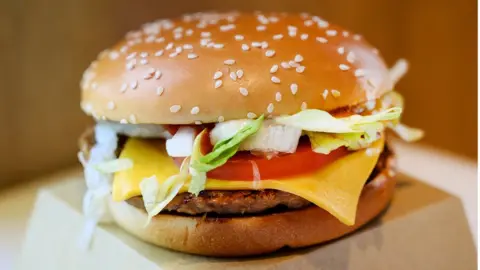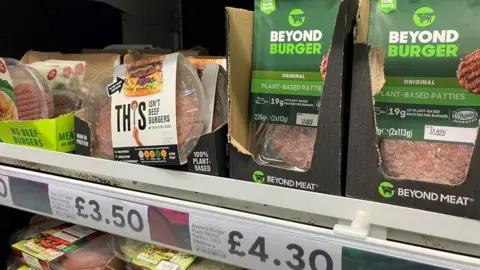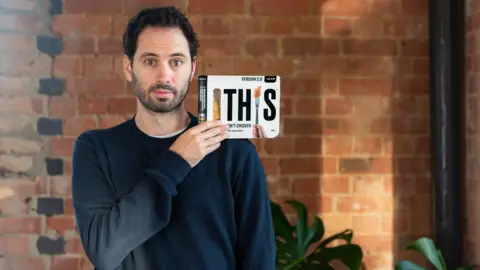Fake meat: As Beyond Meat sales fall, have we had our fill?
 Reuters
ReutersWhen it comes to fake meat Tom Crawford-Clarke has "eaten everything available over the years". But he has fallen out of love with it now.
"We generally favoured Quorn products, Linda McCartney things, Beyond Burgers, Moving Mountains. I always thought they were relatively tasty," he said.
Fake meat is plant-based protein made to resemble burgers or sausages and often marketed as a healthier alternative to the real thing.
But dentist Tom said there was "always something" in the back of his mind about what was in them.
"You don't know what they are, you trust they've been investigated but when a burger oozes this red liquid which is meant to be blood, you wonder what it is," he said.
The 36-year-old from London is referring to the beetroot juice used in Beyond Burgers to mimic blood.
But Beyond Meat's quest for perfection has left shoppers cold. Despite counting actor Leonardo Di Caprio as one of its investors and being one of the UK's most prominent brands, supplying McDonald's and KFC, it has seen a 30% fall in sales.
Indeed a new global survey of 1,000 consumers for vegan firm Strong Roots found that despite 61% of consumers increasing their plant-based intake, 40% are reducing or cutting out fake meat from their diets.
Almost half (47%) said taste was behind the decision, followed by 36% who cited artificial additives and another 36% who stated it was the processed nature of the products which changed their habits.
The drop in demand, partly down to squeezed household budgets, has come at a difficult time for the meat substitute industry.
In June, Meatless Farm went under, making its 50-strong workforce redundant, although the business was bought out of administration in August and its products are back on sale.
In May sausage maker Heck shelved production on the majority of its vegan ranges. Consumers, co-founder Jamie Keeble said, still wanted "something that reminds them of meat".

The term "plant-based" was coined in the 1980s but did not seriously surface on the world stage until 2015, according to the market intelligence agency Mintel.
By that time fake meat products were hitting supermarkets shelves, joining Linda McCartney's ranges which had dominated the sector from the early 1990s. The market exploded - in 2019 almost a quarter of all new UK food products were labelled vegan and nearly two-thirds of Britons put meat substitutes in their shopping baskets.
The projections were for a stellar future - market and consumer data provider Statista suggested the meat-substitute market in the UK would grow annually by 17.5% over the next five years.
But perhaps as an indicator of what was to come, Beyond Meat suffered a slump in sales last year, blaming obstacles with consumers around taste, perceptions of health benefits and price.
The company that ended its first day trading up more than 160% after its New York stock market debut in 2019, saw its shares fall by almost 12% on Monday after it reported a plunge in sales of almost a third.
Certainly the market has cooled - the major UK supermarkets have culled the number of meat-free ranges by 10.9% during the six months to April and research company Kantar said there had been a 7% fall in volume sales over the year until July. But not all fake meat firms are failing.
Andy Shovel is the co-founder and co-CEO of THIS. The self-described "plant-based sausage salesman" presides over a company projected to turnover £20m this year, up from £13m last year. Stocked in most of the leading supermarkets it is ranked third for meat-free sales in the UK, behind Quorn and Richmond.
 This
This"We're really bucking the trend in terms of plant-based companies," he told the BBC. Compared with Beyond Meat, This products are cheaper - two of their burgers cost £3.50 in Tesco, whereas two Beyond Meat Burgers will set you back £4.30. In a cost-of-living crisis that is a significant difference.
"Consumers are more aware of the environmental and ethical impact of meat production now," Mr Shovel said from his Hammersmith base, where the company employs 60 people. "You can't put that back in its box."
What the industry was witnessing was a "kink in the graph rather than a catastrophic failure in the market" he said, comparing it to the craft beer sector when an over proliferation of brands went into consolidation. "I'd say that's where we're at," he added.
Food and drink analyst Hamish Renton, from HRA Global, said in the early days there had been too many marketing dollars chasing not a lot of sales. "Sales were always quite modest, they were fast growing but the expectations of shoppers were very high because of the hype."
Then came taste. "A burger is complicated," Mr Renton said. "It's quite tender but crispy, it's hard to replicate that and the first go at it was not so good. Normally you'd take two to three years to deliver a product and these were being done in months. It was a bit of a bunfight."
Many of the products were triumphs: "Getting a product to bleed, hats off. But just because we can, doesn't mean we should," he added.
The Vegan Society said fake meat products fall into the ultra processed food category which can be a good source of protein often lower in saturated fat.
But the society's nutritionist Andrea Rymer said although they can be a healthier option, consumers "must be mindful of nutritional variations between products".
"Added ingredients such as palm oil, coconut oil and salt will reduce its nutritional quality, increasing saturated fat and salt content," she said.
Mr Renton agreed nutrition was a big factor in putting people off fake meat. "Some serious chemistry needs to go on here - fillers, stabilisers, colourings. But the overall trend in food is for it to be clean. People don't want preservatives or things that alter the pH in what they eat."
Dentist Tom Crawford Clarke summarises the argument for many who have stopped eating meat: "For me, being vegetarian - it's about living from a sustainable point of view. Animal welfare is huge. When I shop I'm not trying to find a replacement for meat, I'm trying to find a different way of eating."
